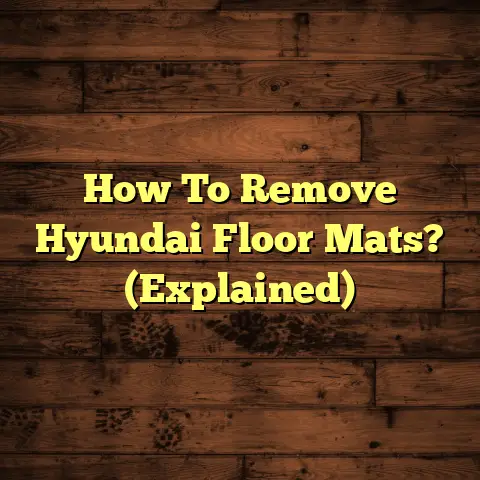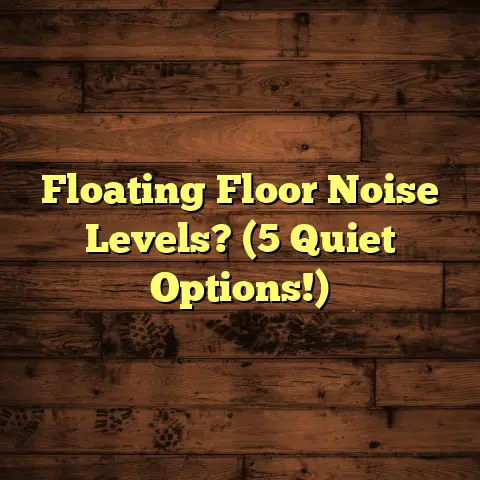Yard Waste: Effective Disposal Solutions? (2 Minute Read)
Think leaves, grass clippings, branches, and all that organic debris that piles up, especially during spring and fall.
Now, you might be thinking, “What does flooring have to do with yard waste?” Well, stick with me. You see, I’ve noticed over the years that a lot of my clients start complaining about allergies right around the time the leaves start falling or the grass is growing like crazy.
And guess what? A big part of that is often related to how we handle all that yard waste. So, let’s dive in and talk about effective ways to manage it, not just for a cleaner yard, but also for better health and a more sustainable environment.
Understanding Yard Waste
Okay, let’s get down to brass tacks. What exactly is yard waste?
It’s essentially any organic material that comes from your yard. We’re talking:
- Grass clippings: Freshly cut grass after mowing.
- Leaves: Fallen leaves, especially abundant in autumn.
- Branches: Pruned branches from trees and shrubs.
- Garden waste: Dead plants, weeds, and other organic matter from your garden.
- Other organic materials: Pine needles, pine cones, and even small twigs.
Think of it as anything that used to be a plant and is now… well, not.
Now, the amount of yard waste we generate definitely changes with the seasons. Spring and summer bring a surge of grass clippings and garden waste, while fall is all about those mountains of leaves.
Winter is usually a bit quieter, but you might still have some branch pruning to do. As a contractor, I see a lot of people neglecting their lawns in the winter.
And what happens when spring rolls around? A whole lotta waste!
So, why should you even care about managing yard waste effectively?
Well, for starters, it keeps a ton of stuff out of landfills. Landfills are already overflowing, and organic waste takes up a lot of space and produces methane, a potent greenhouse gas. According to the EPA, in 2018, landfills received 27 million tons of yard trimmings. That’s a lot!
But it’s not just about reducing landfill waste. Proper yard waste management can also significantly enhance soil health.
Think about it: all that organic matter is full of nutrients. When we compost or mulch it, we’re essentially recycling those nutrients back into our soil, creating a healthier environment for our plants to thrive.
Plus, healthy soil is better at retaining water, which can help reduce your watering bill and make your lawn and garden more resilient to drought.
Health Implications of Improper Yard Waste Disposal
Alright, let’s get to the nitty-gritty: how can improper yard waste disposal affect your health?
It’s not just about aesthetics; it can actually lead to some serious health issues.
One of the biggest problems is allergens. Decomposing yard waste is a breeding ground for mold spores. These spores become airborne and can trigger allergic reactions in sensitive individuals.
Think sneezing, itchy eyes, runny nose, and even asthma attacks.
Pollen is another major culprit. While pollen itself isn’t necessarily caused by improper disposal, leaving piles of leaves and other debris around can trap and concentrate pollen, making allergy season even worse.
And let’s not forget about pests. Piles of leaves and other organic matter provide a perfect hiding place for rodents, insects, and other unwanted critters.
These pests can then make their way into your home, causing damage and spreading disease.
According to the Asthma and Allergy Foundation of America (AAFA), allergies are the 6th leading cause of chronic illness in the U.S., affecting more than 50 million Americans each year.
And while it’s hard to pinpoint exactly how much of that is directly related to improper yard waste disposal, it’s definitely a contributing factor, especially during peak allergy seasons.
I’ve seen firsthand how neglecting yard waste can exacerbate allergy symptoms. I had one client who was constantly battling allergies, and it turned out they had a huge pile of rotting leaves in their backyard.
Once they cleaned it up and started managing their yard waste properly, their allergy symptoms improved dramatically.
Effective Yard Waste Disposal Solutions
Okay, so we know why managing yard waste is important for both the environment and our health. Now, let’s talk about some effective disposal solutions.
Composting
Composting is one of the best ways to deal with yard waste. It’s basically nature’s recycling process. You take organic materials, like leaves, grass clippings, and food scraps, and let them decompose into a nutrient-rich soil amendment called compost.
Composting is a natural process that breaks down organic matter, reducing allergens by promoting the decomposition of materials like pollen-heavy leaves.
When done correctly, it generates heat that can kill off many harmful pathogens and weed seeds.
But how does this help with allergies? Well, by composting your yard waste, you’re reducing the amount of organic matter that’s left to decompose in your yard, which means fewer mold spores and less trapped pollen.
Plus, the compost you create can be used to enrich your garden soil, reducing the need for chemical fertilizers and pesticides.
Setting up a home composting system is easier than you might think. Here’s a step-by-step guide:
-
Choose a composting method: You can use a compost bin, a tumbler, or even just a pile in your backyard. Bins and tumblers are great for controlling odors and keeping pests out, while a simple pile is the most budget-friendly option.
-
Gather your materials: You’ll need a mix of “green” and “brown” materials. Green materials are things like grass clippings, food scraps, and coffee grounds. Brown materials are things like leaves, twigs, and shredded paper.
-
Layer your materials: Start with a layer of brown materials, followed by a layer of green materials. Continue layering, making sure to keep the pile moist but not soggy.
-
Turn your pile regularly: Turning the pile helps to aerate it, which speeds up the decomposition process. Aim to turn it every week or two.
-
Wait: Composting takes time. Depending on the method you use and the materials you’re composting, it can take anywhere from a few months to a year to get finished compost.
-
Use your compost: Once your compost is ready, you can use it to amend your garden soil, topdress your lawn, or even pot plants.
Municipal Yard Waste Collection
Many municipalities offer yard waste collection programs. These programs typically involve collecting yard waste in special bins or bags and then composting it at a central facility.
Check with your local government to see if they have a yard waste collection program in your area. They usually have specific guidelines about what types of yard waste they accept, how it should be prepared, and when it will be collected.
Participating in these programs is a great way to ensure that your yard waste is being managed properly and sustainably.
Plus, it’s often more convenient than composting yourself, especially if you have a large yard or don’t have the time or space for a compost bin.
Community initiatives also play a big role in promoting yard waste recycling. Many communities organize leaf collection drives or offer free composting workshops to encourage residents to manage their yard waste responsibly.
These initiatives are a great way to get involved in your community and learn more about sustainable yard waste management practices.
Mulching
Mulching is another effective way to recycle yard waste and improve your garden or landscape. Mulch is any material that’s spread on the surface of the soil to help retain moisture, suppress weeds, and regulate soil temperature.
It’s like a blanket for your garden!
There are many different types of mulch you can use, including wood chips, bark shreds, straw, and even leaves. Each type of mulch has its own unique benefits and drawbacks.
For example, wood chips are great for suppressing weeds and retaining moisture, but they can take a while to decompose. Leaves, on the other hand, decompose quickly and add nutrients to the soil, but they may not be as effective at suppressing weeds.
Creating mulch from yard waste is easy. You can simply shred leaves with a lawn mower or leaf shredder and then spread them around your plants.
You can also use wood chips from pruned branches, but make sure they’re properly composted before using them in your garden.
Mulching offers several advantages:
-
Moisture retention: Mulch helps to retain moisture in the soil, reducing the need for watering.
-
Weed suppression: Mulch blocks sunlight, preventing weeds from germinating.
-
Soil temperature regulation: Mulch helps to regulate soil temperature, keeping it cooler in the summer and warmer in the winter.
-
Nutrient enrichment: As mulch decomposes, it adds nutrients to the soil, improving soil fertility.
Grasscycling
Grasscycling is the practice of leaving grass clippings on your lawn after mowing. Instead of bagging and disposing of them, you simply let them decompose and return nutrients to the soil.
It’s like giving your lawn a free fertilizer treatment!
Grasscycling offers several environmental benefits. It reduces the amount of waste that goes to landfills, saves water by reducing the need for irrigation, and reduces the need for chemical fertilizers.
Plus, it’s incredibly easy to do. All you need is a mulching lawn mower that chops the grass clippings into small pieces and returns them to the lawn.
Here are some practical tips for implementing grasscycling in your home lawn care routine:
-
Mow frequently: Mow your lawn more frequently, especially during periods of rapid growth. This will prevent the grass clippings from becoming too long and clumping up.
-
Use a mulching mower: A mulching mower chops the grass clippings into small pieces, which decompose more quickly.
-
Don’t mow when the grass is wet: Wet grass clippings can clump up and smother the lawn.
-
Sharpen your mower blades: Sharp mower blades will cut the grass cleanly, resulting in smaller clippings that decompose more easily.
Alternative Disposal Methods
While composting, municipal collection, mulching, and grasscycling are the most common and effective yard waste disposal methods, there are also some alternative options to consider.
Some communities have yard waste drop-off sites where you can bring your yard waste for composting or other processing. These sites are often free or charge a small fee.
You can also consider donating your yard waste to local farms or community gardens. They can often use it for composting or mulching.
In some areas, yard waste is being used for energy production or biofuel. This involves converting the organic matter into biogas or other forms of energy.
While this technology is still relatively new, it has the potential to significantly reduce the amount of yard waste that goes to landfills.
There are also some innovative technologies and practices being developed to handle yard waste more effectively. For example, some companies are using enzymes to speed up the composting process, while others are developing new ways to turn yard waste into valuable products like biochar.
Conclusion
So, there you have it – a comprehensive overview of effective yard waste disposal solutions. As you can see, managing yard waste properly is not just about keeping your yard tidy; it’s also about protecting your health, preserving the environment, and contributing to a more sustainable community.
By adopting proper disposal solutions, you can not only reduce the amount of waste that goes to landfills but also alleviate some of the allergy-related concerns that come with seasonal yard waste.
Whether you choose to compost, participate in municipal collection programs, mulch your garden, or grasscycle your lawn, every little bit helps.
So, get out there, take care of your yard, and do your part to create a cleaner, healthier, and more sustainable world.





